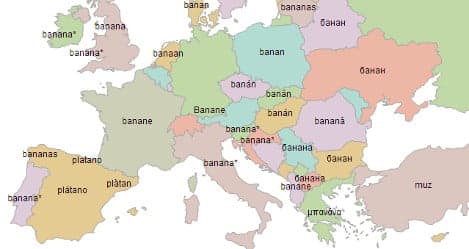Language lovers amazed by interactive map

A fascinating language map lets readers compare words across 30 different European languages at the same time. See if you can find out what words are unique to Spain.
When is a banana not a banana? When you are in Spain apparently.
Almost everywhere else in Europe, the word is similar to English: In Dutch, it's "banaan", and in Iceland the word is "banani" while the Hungarians say "banán".
But in Spain the usual name for the fruit is "plátano", although banana is sometimes used for the sweeter varieties of the fruit.
This is just one of the examples of what can be done with the European word translator map.
Click here to try out the European word translator map for yourself (external link).
Part of the UK Data Explorer series, the map allows people to enter an English word and see its translation into everything from Maltese to Finnish.
Fuelled by Google translate, the map is a goldmine of linguistic information giving an idea of Europe's cultural, linguistic and historical fault lines.
Spain's Arabic past, for instance, means some Spanish words stand out like a sore thumb on the linguistic landscape.
In Spain, for example, the word for "oil" is "aceite" while almost everywhere else it's closer to the English word. The Spanish for meatball — "albóndiga", from the Arabic for "the ball" — is another word is only seen on the Iberian Peninsula.
Then there are other words that Spain has given to the English language and the rest of the Europe. Type in "conquistador" or "macho" and you'll see how far these Spanish words have travelled.
Some words, however, have travelled in the opposite direction. The English words "club", meaning an association, is now used everywhere, including across Spain.
For Spain-based users of the map, there's another advantage: the map includes translations into the Basque, Catalan and Galician languages too.
In the case of Basque, it also shows just how different the language is from the rest of Europe, where Indo-European roots predominate.
The map is not perfect. Creator James Trimble points out that Google Translate is not always reliable. Only one translation is given, which means alternative meanings can be lost.
In some cases the Google tool can't find a translation and the English word is given instead.
Don't miss stories about Spain, join us on Facebook and Twitter.
Comments
See Also
When is a banana not a banana? When you are in Spain apparently.
Almost everywhere else in Europe, the word is similar to English: In Dutch, it's "banaan", and in Iceland the word is "banani" while the Hungarians say "banán".
But in Spain the usual name for the fruit is "plátano", although banana is sometimes used for the sweeter varieties of the fruit.
This is just one of the examples of what can be done with the European word translator map.
Click here to try out the European word translator map for yourself (external link).
Part of the UK Data Explorer series, the map allows people to enter an English word and see its translation into everything from Maltese to Finnish.
Fuelled by Google translate, the map is a goldmine of linguistic information giving an idea of Europe's cultural, linguistic and historical fault lines.
Spain's Arabic past, for instance, means some Spanish words stand out like a sore thumb on the linguistic landscape.
In Spain, for example, the word for "oil" is "aceite" while almost everywhere else it's closer to the English word. The Spanish for meatball — "albóndiga", from the Arabic for "the ball" — is another word is only seen on the Iberian Peninsula.
Then there are other words that Spain has given to the English language and the rest of the Europe. Type in "conquistador" or "macho" and you'll see how far these Spanish words have travelled.
Some words, however, have travelled in the opposite direction. The English words "club", meaning an association, is now used everywhere, including across Spain.
For Spain-based users of the map, there's another advantage: the map includes translations into the Basque, Catalan and Galician languages too.
In the case of Basque, it also shows just how different the language is from the rest of Europe, where Indo-European roots predominate.
The map is not perfect. Creator James Trimble points out that Google Translate is not always reliable. Only one translation is given, which means alternative meanings can be lost.
In some cases the Google tool can't find a translation and the English word is given instead.
Don't miss stories about Spain, join us on Facebook and Twitter.
Join the conversation in our comments section below. Share your own views and experience and if you have a question or suggestion for our journalists then email us at [email protected].
Please keep comments civil, constructive and on topic – and make sure to read our terms of use before getting involved.
Please log in here to leave a comment.